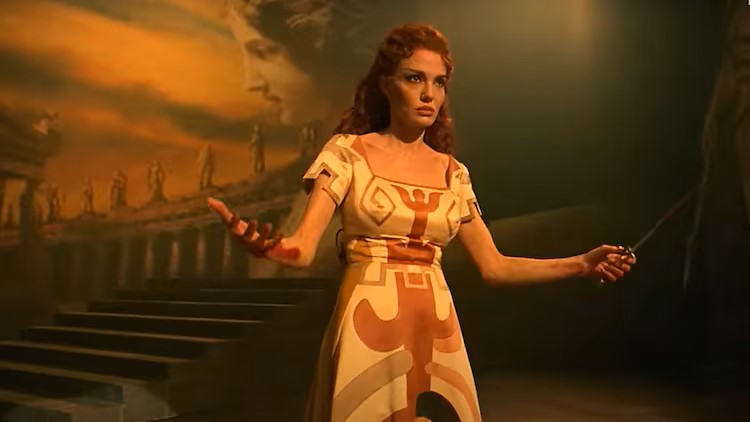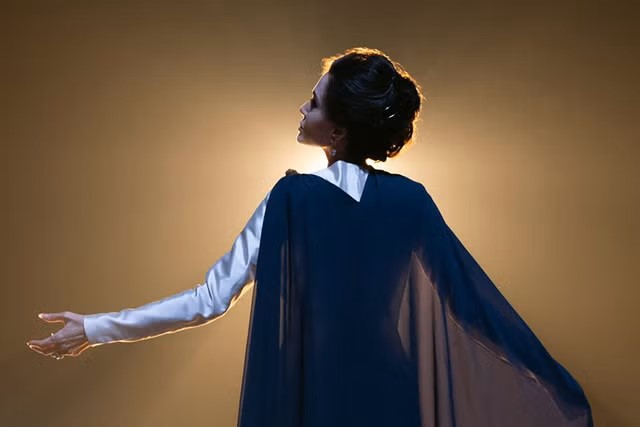
Reeder’s Movie Reviews: Maria
“Maria Callas was someone that as she was singing, she was dying every time. Life was taken from her while she sang.”
The Chilean writer-director Pablo Larrain has a fascination with mortality. The manifestations of it course throughout his work. In many respects, it inspires his art.
Having already explored the lives of two iconic twentieth-century women in his earlier films Jackie (2016) and Spencer (2021), he completes the trilogy with his latest, Maria. You can’t really approach, much less appreciate, this picture as a straightforward biography. Instead, think of it as a contemplation of a brilliant artist, “La Divina” (“The Divine One”). And, while you’re at it, relish the best work by Angelina Jolie since Changeling (2008).
Maria Callas was born in New York City to Greek immigrant parents in 1923. She received her serious musical education in Athens from the age of thirteen, although her mother had forced her to sing from the age of five. The resentment it caused–that sense of a lost childhood–stayed with Callas for the rest of her life. She made her professional operatic debut at 17 and, remarkably, first sang the title role in Giacomo Puccini’s Tosca–what would become a signature role for her–just a year later. Its most famous aria, “Vissi d’arte,” looms large in the film.
Maria plays out in the final week of Callas’ life in September, 1977. She lives as a recluse in a sumptuous apartment in Paris, assisted by her maid Bruna (Alba Rohrwacher) and butler-driver Ferruccio (Pierfrancesco Favino). She restricts her outings to a small group of discreet venues; largely declines publicity; and consumes significant amounts of non-prescription drugs. Mandrax, her substance of choice, spawns an imaginary journalist of the same name (Kodi Smit-McPhee) who supposedly chronicles her last days.
Copious flashbacks, aided by well-chosen newsreel footage, offer the grace notes, both narratively and visually. For the dramatized moments in her life, Larrain and cinematographer Edward Lachman (Carol, Dark Waters) make effective use of black-and-white and sepia tone. In many of the domestic scenes, the choice of natural light adds a muted, bittersweet quality.
Like Natalie Portman as Jackie and Kristen Stewart as Spencer, Jolie as Maria Callas hopes to reclaim her sense of self in a world too eager to narrowly define and underestimate her. Granted, Callas’ frequent hallucinations here make her an unreliable witness to her own life, but they lend an imaginative, kaleidoscopic dimension to the storytelling. The renowned Argentine author Jorge Luis Borges maintained that “poetry is not meant to be understood; it is meant to be felt.” Larrain and the British screenwriter Steven Knight (Locke, Spencer) want you to do the same with this movie.
Angelina Jolie looks every bit the diva in Maria. She has the face, the stature, and the regal presence of a leading lady. Even when the script fails to soar, her ability to project strength, rudeness and vulnerability gives the story a consistent focus. Her scenes with the Turkish actor Haluk Bilginer as Aristotle Onassis (who would later leave her for Jacqueline Kennedy) range from playful banter to sweet resignation. And in an imagined conversation with John F. Kennedy (whom Callas actually did meet in real life), she describes the two of them as “very lucky angels.” Privilege, though, has its limits.
Jolie also sings. You’ll hear a wealth of historical Callas recordings, but you’ll also hear operatic arias in which the voices of Callas and Jolie are blended. Credit to the actress for working so diligently on posture, breathing and body language. If you’re an opera lover, you’ll delight in selections by Bellini, Donizetti, Verdi, Puccini, Bizet, and Wagner.
One of the more ironic moments in the picture finds “La Callas” ruefully listening to some of her own recordings and concluding that she can never achieve that level of perfection again. In fact, Callas was blessed with a nearly three-octave range. She was a legendary performer with a highly expressive and unmistakable voice, whose imperfections–the missed or blurred notes–were readily overlooked (at least in her two decade-long prime) because of her extraordinary acting skills. In Maria, she laments that she has “no life away from the stage.”
Natalie Portman earned an Academy Award nomination for Best Actress for her portrayal of Jacqueline Kennedy Onassis in Jackie. Likewise, Kristen Stewart for her performance as Lady Diana in Spencer. Angelina Jolie may follow suit, although she faces heavy competition in a category brimming with outstanding work this year.
Admittedly, Maria proceeds at a rather slow, measured pace. Pablo Larrain’s film is not a race to the end–in fact, the end is also the beginning here–but rather a portrait of a legendary artist navigating the final week of an eventful life. It’s a movie sustained by a strong performance by its lead actress, a mix of fact and dramatic license, lavish sets and costumes, and an artful soundtrack. “La Divina” may believe “there is no reason in opera,” but you have plenty of reasons to check out Maria.
P.S. If you’re intrigued by Maria Callas and her extraordinary life and career, the French-produced documentary Maria by Callas (2017) comes highly recommended.
More Movie Reviews:

Reeder’s Movie Reviews: Mufasa: The Lion King
It seems an unlikely combination: Walt Disney Pictures’ lucrative franchise The Lion King in the directorial hands of Barry Jenkins, the auteur of several praiseworthy indie productions, including the Academy Award-winning Best Picture Moonlight (2016). The result is technically accomplished, but emotionally frustrating.

Reeder’s Movie Reviews: Deadpool & Wolverine
Disney/Marvel Read “I don’t know anything about saving worlds, but you do.” -Deadpool addressing Wolverine The meta has overtaken the Marvel Cinematic Universe (MCU). After a six-year period marked by

Reeder’s Movie Reviews: Maestro
Biopics are notoriously fraught with difficulty. They have to achieve an emotional and intellectual resonance, as well as a period look and feel. The script has to reflect and enhance the inherent drama in the lives of its characters, and the main one really has to matter. In Oppenheimer, the British-American writer-director Christopher Nolan embraces the challenge of telling the story of the “most important person who ever lived,” as he puts it.
















